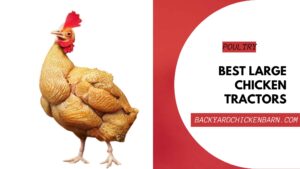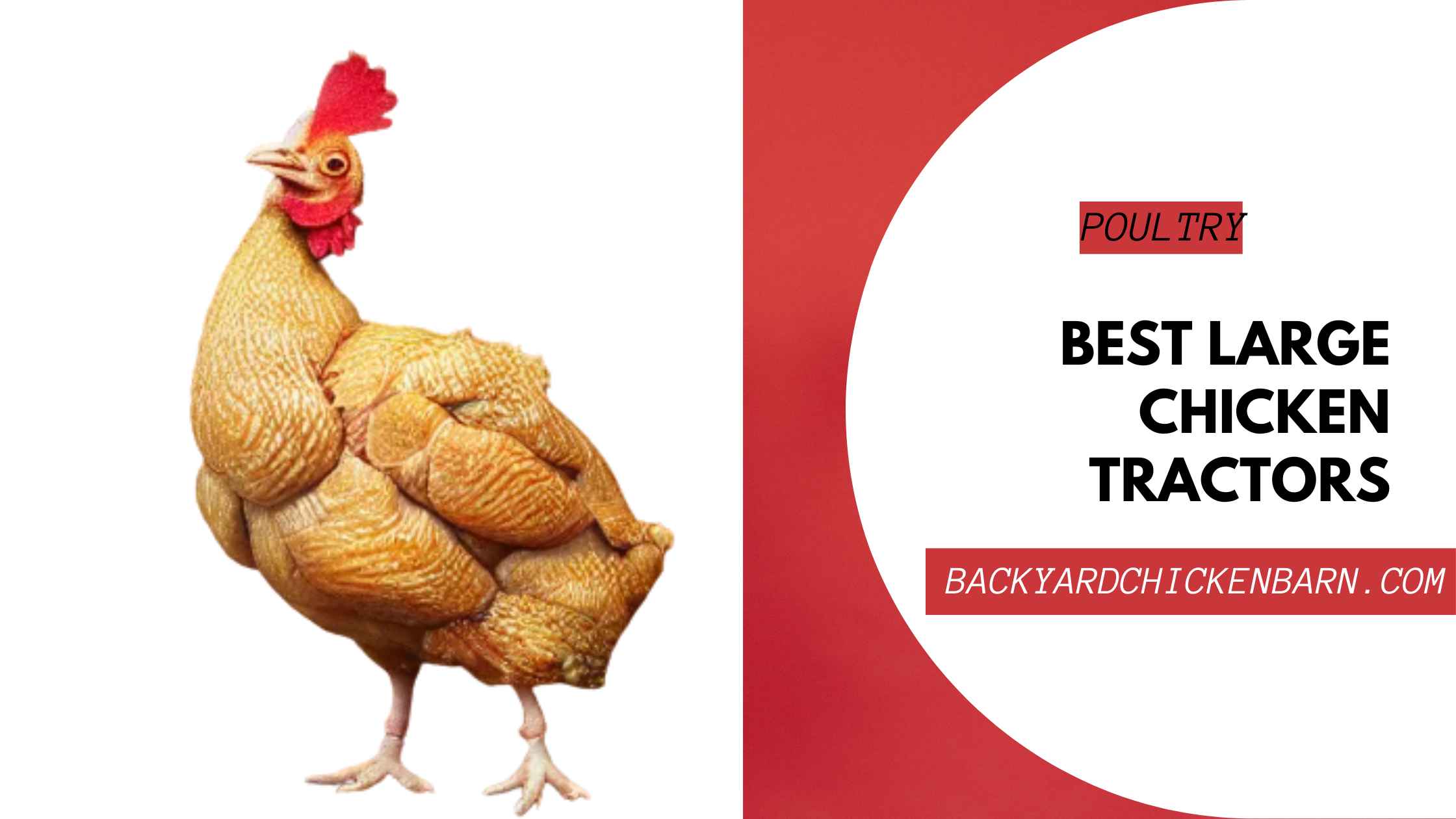Best Large Chicken Tractors – WHAT YOU NEED TO KNOW
Chicken tractors, mobile chicken coops equipped with wheels or skids, have become increasingly popular among poultry enthusiasts and backyard farmers.
This is due to their versatility, ease of use, and the ability to provide chickens with fresh patches of ground regularly. For those who have larger flocks or expansive backyards, a large chicken tractor can be a valuable asset.
Here’s a guide to the best large chicken tractors available:
1. Introduction to Large Chicken Tractors
Large chicken tractors are ideal for those who have:
- Bigger flocks of 20 or more birds.
- The need to frequently relocate their chickens around a large property.
- A desire to combine free-ranging benefits with predator protection.
2. Benefits of Using Large Chicken Tractors
- Mobility: Easy to move around, ensuring chickens always have fresh grass and insects.
- Predator Protection: Keeps chickens safe from predators while they forage.
- Egg Quality: Access to fresh forage can enhance the nutritional value and taste of the eggs.
- Soil Enrichment: Chickens naturally fertilize the ground they are on, improving soil health.
3. Top Large Chicken Tractors to Consider
A. The Deluxe Poultry Palace
- Features: This tractor boasts a spacious interior, nest boxes, and a large roaming area.
- Capacity: Up to 30 birds.
- Material: Treated wood and galvanized wire mesh for added durability.
B. The Free-Range Rover
- Features: Equipped with a unique wheel system for easier relocation and an elevated coop for added protection.
- Capacity: 25-28 birds.
- Material: Cedarwood and strong, predator-resistant wire mesh.
C. The Pasture Pioneer
- Features: A longer design that provides ample space for chickens to roam and forage.
- Capacity: Up to 35 birds.
- Material: Pine with a waterproof finish and sturdy wire mesh.
4. Features to Look For in a Large Chicken Tractor
- Sturdiness: Given its size, a large chicken tractor needs to be particularly robust.
- Easy Mobility: Look for models with high-quality wheels or skid systems.
- Secure Locks: Predators can be persistent. Ensure the tractor has secure latches.
- Adequate Ventilation: Larger flocks produce more heat and moisture, so good ventilation is vital.
- Accessible Nest Boxes: This makes egg collection easier.
5. Tips for Using Large Chicken Tractors
- Rotate Regularly: Move the tractor to fresh grass every 1-2 days to prevent overgrazing.
- Monitor Soil Health: If an area becomes too compacted or barren, give it time to recover before placing the tractor there again.
- Provide Supplemental Feed: While foraging provides many nutrients, you may still need to provide additional feed, especially in winter.
- Regular Maintenance: Check for wear and tear frequently to ensure the tractor remains safe and functional.
Conclusion
Large chicken tractors are an excellent investment for those with larger flocks or expansive outdoor spaces.
They offer a harmonious blend of free-ranging benefits and safety, ensuring that your chickens are happy, healthy, and productive.
When selecting a model, prioritize durability, mobility, and security to get the best value for your money.
ALSO SEE: Best Predator-Proof Latches for Chicken Coops

FAQs on Large Chicken Tractors
1. What is a chicken tractor? A chicken tractor is a mobile chicken coop, often with an open bottom, allowing the chickens to access fresh ground regularly.
2. Why use a chicken tractor instead of a stationary coop? Chicken tractors can be moved to provide fresh forage and prevent overgrazing. They also naturally fertilize different parts of your land.
3. How often should I move the tractor? For large chicken tractors, moving every 1-2 days is recommended, but it can vary depending on the size of the flock and the area of the tractor.
4. Is a chicken tractor predator-proof? While many are designed to be robust against predators, always check for sturdy locks and durable materials.
5. How many chickens can a large chicken tractor accommodate? It depends on the design, but large ones can typically house 20-35 birds.
6. Do chicken tractors have nesting boxes? Yes, most designs incorporate nesting boxes for egg-laying.
7. How do I clean a chicken tractor? Since it’s mobile, simply move it to a new location and clean the previous spot. The coop area can be cleaned like any other coop.
8. Are there specific breeds best suited for chicken tractors? No, most chicken breeds can adapt to life in a tractor. However, more active breeds might appreciate the change in scenery more.
9. Do I need a permit for a chicken tractor? Local regulations vary. Always check with local authorities.
10. Is assembling a chicken tractor difficult? Most commercial models come with assembly instructions. Some might require two people due to size.
11. Can I build my own chicken tractor? Yes, many poultry enthusiasts design and build their own based on their specific needs.
12. Do chicken tractors provide adequate ventilation? Most designs prioritize ventilation. Always ensure good airflow, especially in summer.
13. Can I use a chicken tractor in winter? Yes, but ensure it offers adequate protection against cold winds and snow.
14. Do chickens lay fewer eggs in a tractor? No, in fact, the constant access to fresh forage might boost egg production.
15. Can I keep roosters in a chicken tractor? Yes, but be aware of local noise ordinances and potential aggression issues.
16. How do I provide water in a chicken tractor? Portable waterers can be used and moved with the tractor.
17. What should the floor of a chicken tractor be made of? Most have open bottoms for grazing, but the coop section may have a wooden or mesh floor.
18. Can I keep other birds, like ducks, in a chicken tractor? Yes, but ensure their specific needs (like a water source for ducks) are met.
19. How do I prevent the tractor from getting stuck when moving? Regular maintenance and ensuring the ground isn’t too wet can help. Some people also use skids instead of wheels.
20. Is there a risk of disease in chicken tractors? The risk is reduced since chickens have access to fresh ground regularly.
21. Can chicks be kept in a chicken tractor? Yes, but ensure they’re protected from adverse weather and predators.
22. Do I need to provide supplemental lighting in a tractor? Not typically, but if egg production drops in winter, supplemental lighting might help.
23. How do I feed chickens in a tractor? You can use portable feeders or hang feeders in the coop section.
24. Are chicken tractors expensive? Prices vary based on size, materials, and design features.
25. Can I attach an automatic door to my chicken tractor? Yes, many modern designs can accommodate automatic doors.
26. Is a tractor suitable for broody hens? Yes, but ensure she has a quiet and secure spot for nesting.
27. How long do chicken tractors last? With proper care, many last for several years.
28. Can I attach a run to a chicken tractor? Some models allow for extensions or attached runs.
29. Do tractors protect against aerial predators? Yes, the mesh or wired top keeps birds of prey out.
30. Can I use electric fencing with a chicken tractor? Yes, some farmers use portable electric fences for added protection.
31. How heavy is a large chicken tractor? Weights vary, but they can be hefty. Check specifications before purchasing.
32. Are there eco-friendly chicken tractor models? Yes, some are made of sustainable materials and designed for minimal environmental impact.
33. Can I keep bantams in a large chicken tractor? Yes, but ensure the mesh is fine enough to keep them secure.
34. How do I treat mites or lice in a chicken tractor? Move the tractor, clean the previous spot, and treat the birds as needed.
35. Are there any drawbacks to using a chicken tractor? Maneuvering large tractors can be challenging, and they might not offer as much insulation as stationary coops.
36. Can I add insulation to a chicken tractor? Yes, but ensure it doesn’t compromise ventilation.
37. Do chicken tractors need perches? Yes, chickens naturally roost, so provide perches in the coop section.
38. How do I handle aggressive birds in a tractor? You can separate them temporarily or use techniques like pinless peepers.
39. Are there financing options for chicken tractors? Some larger manufacturers might offer financing.
40. Do I need to vaccinate my chickens if they’re in a tractor? Vaccination decisions should be based on local disease risks, not housing type. Consult a veterinarian.


